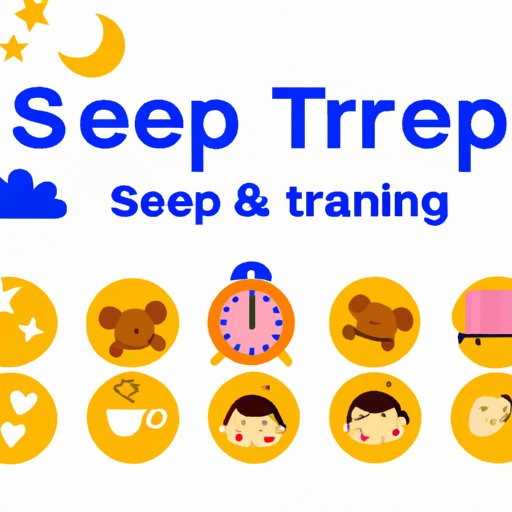
Introduction
As a new parent, it’s no surprise that you’re looking to get your little one to sleep soundly through the night as soon as possible. Sleep training can be an incredibly helpful tool to achieve this goal. It’s a process in which you teach your baby to sleep through the night on their own, without needing to be fed or rocked to sleep.
In this article, we’ll explore when it might be appropriate to start sleep training and offer expert advice to help make the process easier for you and your baby. We’ll also discuss the importance of good sleep for both your baby and for you, the parents.
Age-Based Approach
The age range in which parents typically start sleep training varies widely. Some parents begin when their baby is just a few weeks old, while others may wait until their child is as old as six months.
According to the American Academy of Pediatrics, sleep training is safe for babies starting at around four to six months old. Before this age, babies don’t have the ability to self-soothe or regulate their own emotions and needs. This means that sleep training your baby before this stage may not be beneficial, or even harmful.
However, every baby is different, and some may be ready for sleep training earlier or later than others. It’s essential to observe and understand your baby’s unique behavior and temperament before starting sleep training.
Sleeping Patterns
A significant part of sleep training is analyzing your baby’s eating and sleeping patterns. It’s essential to have a solid understanding of these patterns before starting sleep training.
Babies aged four to six months typically begin sleeping in longer stretches of about six to eight hours at night. However, some babies may still wake up more often or have trouble sleeping through the night. If you notice that your baby is waking up more than is typical, it may be time to consider sleep training.
When you start sleep training, start by establishing a sleep schedule. Introduce a pre-bedtime routine that you can stick to every night. This might involve reading a story or singing a lullaby to help your baby relax before bed. It’s essential to keep your baby’s sleep environment as quiet and comfortable as possible as well.
Developmental Milestones
Another factor to consider when deciding when to start sleep training is your baby’s developmental milestones. As babies grow and learn new skills, it can affect their sleep patterns and their ability to self-soothe.
For example, around four months, babies may start to roll over, which can lead to sleep disruptions and anxiety if they’re not accustomed to sleeping on their own. Teething can also affect sleep patterns, and your baby’s temperament and personality can affect how they react to sleep training.
The developmental milestones that most commonly affect sleep training are those related to mobility and cognitive development. Once your baby has reached an appropriate stage of development, it may be time to start sleep training.
Family Lifestyle
Another important factor to consider when deciding when to start sleep training is your family’s lifestyle. If you work outside of the home, for example, you may need to consider how your baby’s sleep schedule fits in with your schedule.
If you have other children or family members living in your home, it’s important to consider how your baby’s sleep schedule fits into everyone else’s schedules. It’s important for your baby to have a consistent sleep schedule that works for everyone in the household.
Other lifestyle factors that you should consider include any upcoming travel plans or changes to your schedule that may affect your baby’s sleep routine.
Expert Opinions
When it comes to sleep training, it’s always a good idea to seek out advice from experts in the field. Pediatricians, sleep consultants, and other professionals can offer valuable insight and guidance to help make the sleep training process easier.
According to many experts, the best time to start sleep training is when your baby is between four and six months old. This age range is when babies are typically ready to learn how to self-soothe and regulate their own sleep patterns.
It’s important to note that sleep training may not work for every baby or family. Some families may opt for alternative methods, such as the “no cry” method or a more gradual approach to sleep training.
Experts also offer tips for making the sleep training process as stress-free as possible. These include creating a consistent bedtime routine, setting up a comfortable sleep environment, and implementing a plan that fits your baby’s unique needs and temperament.
Conclusion
Sleep training can be an effective way to help your baby learn healthy sleep habits and allow you, as the parent, to get some much-needed rest as well. However, picking the right time to start sleep training can be challenging.
Based on expert opinions and taking into account your baby’s unique needs and developmental stage, age four to six months old is often the optimal time to start sleep training.
Remember, sleep training may not work for every baby or family. If you’re considering sleep training, be sure to consult your pediatrician, sleep consultant, or another expert for guidance. And most importantly, be patient and gentle with your baby as they learn to sleep on their own.




